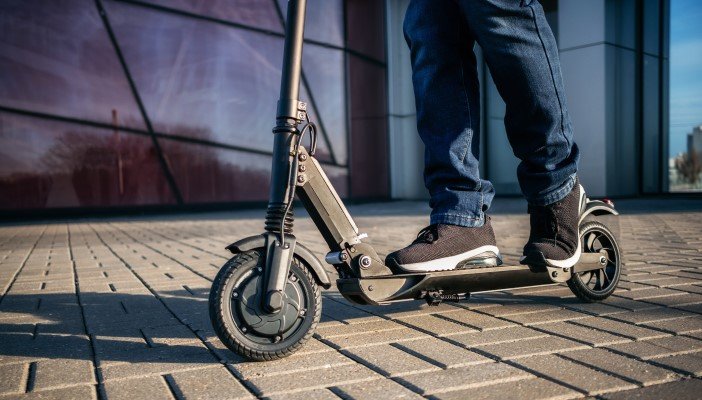Highlighting the e-scooter challenge to safety on our streets
As the Government considers the legalisation of e-scooters, and with trial rental schemes on their way, we’ve given our recommendations for safe and accessible streets.

In recent months there has been a lot of discussion around ‘micromobility’ vehicles, including e-scooters (electric scooters), and their legalisation for use in UK public spaces. As this prospect gets closer to reality, we have serious concerns about the impact these vehicles will have on the safety, confidence and independence of blind and partially sighted people.
What’s happening now?
The House of Commons Transport Committee has asked for views on whether e-scooters should be legalised, and the Department for Transport (DfT) is set to begin trials of rental e-scooters sooner, and in more areas, than previously planned. The DfT says these trials have been brought forward because of the coronavirus pandemic, to support social distancing by creating another travel option in light of reduced public transport.
Microbility explained
Micromobility vehicles are small mobility vehicles, which are powered partly, or fully, by a motor. For example, e-bikes (electronic bicycles) have already been approved for use, including for dockless bike hire schemes in many areas around the UK. But there are several types of micromobility vehicles which are not currently allowed on public spaces in the UK. These include e-scooters, electric skateboards and self-balancing vehicles.
What our survey told us
In our recent travel survey, 81 per cent of respondents to told us it is important, or very important, to be able to walk independently, without a sighted guide. The prospect of an increase in quiet vehicles on our streets is making many worry about the impact on their safety. For example, we were told:
- “Bicycles and e-scooters, they make very little sound so that you are unable to hear them coming close to you. I have had a few of them knock me down in the past.”
- “It could be the end of independent travel for me.”
E-scooters are extremely difficult for blind or partially sighted people to see and hear. It may not always be obvious to someone riding an e-scooter they are approaching a pedestrian with sight loss. These vehicles will travel at higher speeds more often than pedestrians or pedal bicycles. They can be heavy, so we have serious concerns about the risk of collisions with blind or partially sighted pedestrians.
Where dockless bike schemes exist currently, we have already seen a big increase in bicycles parked on pavements, causing dangerous trip hazards for blind and partially sighted pedestrians. Dockless e-scooter hire schemes will add to this problem. Speaking of existing dockless bike schemes, one person told us:
- “Dockless bikes have significantly impacted on my ability to navigate independently around London. I now can't walk the 10 minutes from the train station to work, and have to take a bus instead, because I was constantly injuring myself on bikes left abandoned on the pavements.”
Our recommendations
We remain concerned that even with steps taken to reduce the risk of collisions, e-scooters on our streets pose a threat to the confidence and independence of many blind and partially sighted people when walking.
However, with the prospect of e-scooters being trialled soon, we’ve made recommendations to reduce the risk of collisions and to stop streets from becoming inaccessible. Our recommendations include:
- E-scooters must be restricted to the road and cycleways, and there should be effective enforcement against driving e-scooters on pavements.
- Pavements and footways should always be marked with a detectable kerb (with a minimum height of 60mm). Accessible, signal controlled pedestrian crossings (such as pelican crossings), with correctly installed tactile paving, must be included on roads and cycleways.
- There should be a nationwide public awareness campaign, to educate the public about the reasons why driving (and cycling) on pavements is detrimental to disabled people’s safety, confidence and independence.
- A requirement for e-scooters to make a recognisable sound should be carefully considered. This would make them much more detectable – and therefore safer – for blind and partially sighted pedestrians.
- Maximum speed limits for e-scooters should be implemented and guaranteed. We recommend the maximum speed limit of e-scooter to be as close to average walking speed as possible (4mph), and certainly no more than 12.5mph.
- There must be requirements for the safe parking of e-scooters. We believe that the safest and most effective parking scheme will be for them to be parked in specified bays on the road.
- Registration, licensing and insurance requirements for e-scooters should be carefully considered.
- There should be consultations with local disabled people, including blind and partially sighted people, about decisions on where and how trial rental e-scooter schemes are set up.
- There should be a full public consultation at the end of the 12 month trial period, on whether e-scooter rental schemes, and private-use e-scooters, should be legalised in the longer-term or permanently.
Have your say
We asked blind and partially sighted people to share their views and experiences through our transport survey and online focus groups, and we’ve submitted our responses to the Transport Committee and the DfT.
There’s still another Government consultation open, which is focused on the long term future of e-scooters and other micromobility, and the rules e-scooter owners would have to follow in the future. So we still need you to share your experiences in our survey, which is open until 15 June.
Take Action
Any changes to our streets must be accessible to everyone. Councils are rapidly making changes to our streets to encourage more walking and cycling, so that fewer people rely on public transport. Along with our concerns over e-scooters, we’re worried that the speed of change will make it more difficult for blind and partially sighted people to get out and about.
Please write to your local councillor, asking them to make sure any local changes are accessible for everyone.







